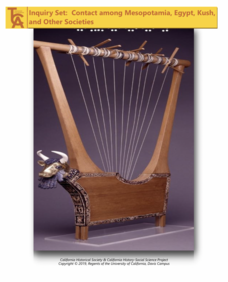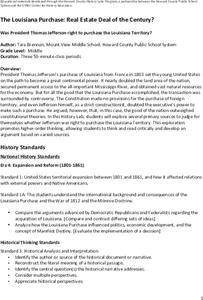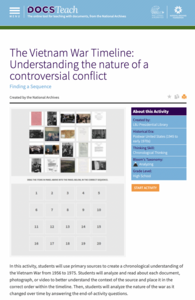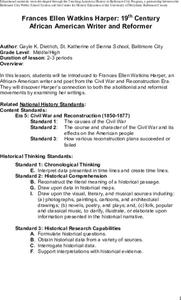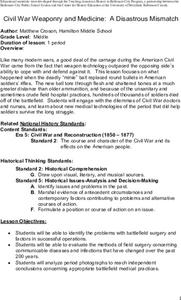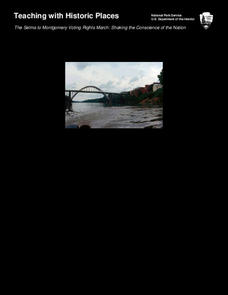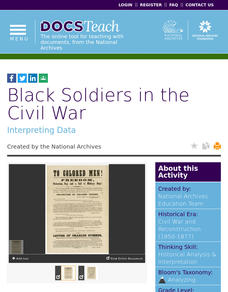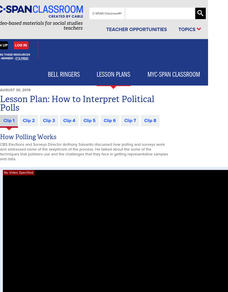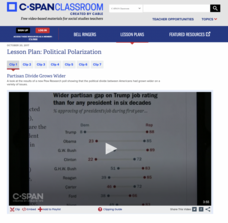University of California
Contact among Mesopotamia, Egypt, Kush, and Other Societies
Trade has always been a global affair. Explore what global trade meant for ancient Mesopotamians, Egyptians, and Kushites using a collection of documents from the historic societies. By examining literary works such as the Epic of...
National Park Service
Remembering Pearl Harbor: The USS Arizona Memorial
Young historians use primary source materials to investigate the 1941 attack on Pearl Harbor and the sinking of the USS Arizona. After reading background articles and studying maps and images of the attack, class members consider whether...
Center for History Education
U.S. Foreign Policy and the Iran-Contra Affair: Was Oliver North a Patriot, a Pawn, or an Outlaw?
If you had to write a song about Oliver North, would it be a ballad or a dirge? If you had to put him on a trading card, would he be a hero or the bad guy? Young historians decide for themselves after examining documents from the...
Center for History Education
Guatemalan Coup of 1954: How Did the Cold War Influence American Foreign Policy Decisions?
Was it all about the bananas—or the fear of a communist threat? Young historians use a history lab to examine documents from the American-led 1954 Guatemalan coup. Using graphics, government documents, and speeches, they examine the...
Center for History Education
The Louisiana Purchase: Real Estate Deal of the Century?
It's about real estate! Almost overnight, Thomas Jefferson's Louisiana Purchase about doubled the size of the young United States ... but was it constitutional? Using a variety of secondary and primary sources, including Jefferson's own...
DocsTeach
The Vietnam War Timeline: Understanding the Nature of a Controversial Conflict
The story of the Vietnam War is often told through images. Young historians analyze images and primary sources —including the Vietnamese Army's Seven Commandments poster and photos of the daily life of soldiers—to construct a timeline of...
Center for History Education
The Federal Theatre Project: Analyzing Conflict Among Relief, Art, and Politics in 1930s America
In the effort to soothe the suffering of the Great Depression, New Deal programs funded a variety of approaches - including a theater project that proved controversial! Using documents such as oral histories, as well as photographs of...
Center for History Education
Maryland During the Secession Crisis
While many think the United States was neatly divided between Northern and Southern states during the Civil War, border states like Maryland are more complicated. Using hands-on activities to measure distance and primary sources,...
Center for History Education
Frances Ellen Watkins Harper: 19th Century African-American Writer and Reformer
Although some African American abolitionists—such as Sojourner Truth and Frederick Douglass—are well known, others, like Frances Ellen Watkins Harper, remain in the shadows of history. Harper was a poet and activist who played an...
Center for History Education
Civil War Weaponry and Medicine: A Disastrous Mismatch
Ironically, science was the reason why the Civil War was so deadly. Despite the use of medical practices now considered barbaric—such as conducting surgery with bare, dirty hands—developments in weaponry meant that more men died on and...
Center for History Education
Northern Racism and the New York City Draft Riots of 1863
Just how racist were some people in the North during the American Civil War? Using excerpts of the Conscription Act, as well as graphic images of lynchings, young historians consider why white people in New York City rioted and killed...
Center for History Education
Slavery and Civil Disobedience: Christiana Riot of 1851
When is it a moral obligation to disobey the law or to fight back? Using primary sources that document the "Christiana Riot" of 1851, learners consider these questions. The firsthand accounts tell the story of the riot, which happened...
National Park Service
The Selma to Montgomery Voting Rights March: Shaking the Conscience of the Nation
Travel back in time to examine how tragic events can spur positive change. Scholars explore the impact of the Selma Voting Rights March, including the tragic loss of life and the later signing of the Voting Rights Act of 1965. Academics...
National Park Service
Discover the Mary Ann Shadd Cary House
Mary Ann Shadd Cary was an extraordinary woman, no matter the time period. Academics research the life and achievements of Mrs. Cary, who was born a free African American in 1823. The lesson uses primary sources, worksheets, written...
DocsTeach
Analyzing a Map of the Louisiana Purchase
With the stroke of a pen, Thomas Jefferson roughly doubled the size of the United States. The Louisiana Purchase not only grew the new country, but also it gave rise to the legends surrounding westward expansion and accelerated the...
DocsTeach
Comparing Civil War Recruitment Posters
African Americans fought in the Civil War, and they were recruited by both the Union and the Confederacy! By comparing the wording of posters—one directed at freedmen and another to the owners of enslaved people—young historians discover...
DocsTeach
Black Soldiers in the Civil War
Get hands on virtually with recruitment posters for African American soldiers during the Civil War with an interactive online resource. By highlighting key phrases in the posters using an Internet tool, learners discover how African...
DocsTeach
A Petition for the Cotton Gin
While almost forgotten today, the cotton gin could be seen as one of the causes of the Civil War. The innovation led to more cotton production, which in turn undermined political power balances in the 1800s. Individuals unpack the...
National Endowment for the Humanities
“From Time to Time”: Presidents and Communicating with the Public
While the Constitution requires a "State of the Union" address, it doesn't give many details. In fact, it wasn't until Woodrow Wilson that the periodic update to Congress was given in-person. Using primary sources, recordings and...
C-SPAN
How to Interpret Political Polls
While numbers don't lie, the reliability of information in a poll may be difficult to discern. After viewing video clips with polling experts, young scholars consider how polls work and the elements of a reliable poll. Extension...
C-SPAN
Political Polarization
Dive into the political breach with pupils and explore the reasons for political polarization. Using clips from C-SPAN that include discussions from reporters and scholars, class members consider what is causing the political fault lines...
C-SPAN
Should Your State Modify Its Voter Registration Laws and Methods for Submitting a Ballot?
What is the balance between democracy and security? Using articles and videos that examine state voting procedures, learners explore the difficult question. After looking at voting regulations in their state and nationally, they consider...
C-SPAN
Evaluating Historical Presidential Campaign Ads
Political ads flood the airwaves each election cycle. An activity including more than a dozen political ads from iconic presidential campaigns helps learners unpack how the sausage gets made during election "silly season." Using the...
US Department of Commerce
Featured Activity: Exploring Questions for the 2020 Census
Just what is the census for? Using data and census questions, class members explore how officials gather information. Then, they consider how the government uses the answers to determine how it spends its money with a collaborative...


